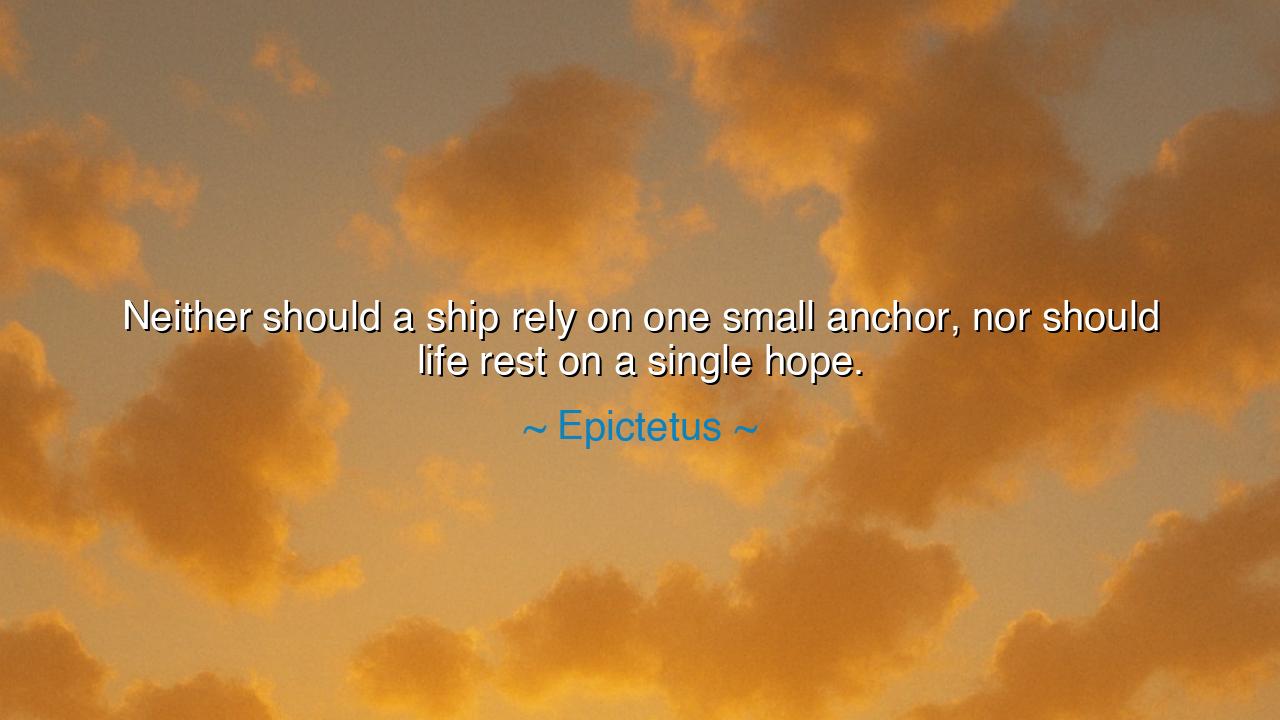
Neither should a ship rely on one small anchor, nor should life






Hearken, children of wisdom, and ponder the words of the Stoic sage, Epictetus: “Neither should a ship rely on one small anchor, nor should life rest on a single hope.” In this saying lies the timeless counsel of resilience, foresight, and balance. The ancients, who knew both the storms of the sea and the tempests of fate, understood that survival depends not on one fragile foundation, but on the strength of many—on adaptability, courage, and the wisdom to diversify the sources of one’s strength.
Epictetus, once a slave who rose to become a philosopher of freedom, spoke from the experience of a life tested by fortune. His words remind us that life, like the sea, is unpredictable, and that those who rely upon a single point of security—be it wealth, a person, a dream, or a single circumstance—invite ruin when that anchor fails. Just as the mariner must cast more than one anchor to hold fast in a storm, so must the wise man secure his heart and purpose through multiple sources of stability: knowledge, virtue, faith, and community.
The anchor, in Epictetus’ metaphor, is not merely a tool of sailors but a symbol of dependence and attachment. One small anchor may suffice in calm waters, but when the winds rise and the waves crash, it cannot hold the ship. So too in life: when fate turns, when fortune shifts, when the things we counted upon fail us, the soul that has only one source of hope is easily cast adrift. The wise cultivate many—hope in their own strength, in their values, in the goodwill of others, and in the vast order of the universe.
History offers many lessons that reflect this truth. Consider the fall of Croesus, the king of Lydia, famed for his immense wealth. He believed gold alone could secure his happiness and safety. Yet when Cyrus of Persia conquered his lands, Croesus learned that riches could not shield him from the flame of fate. It was not until he placed his trust not in wealth, but in wisdom and humility, that he found peace even in captivity. His new “anchors” were no longer material, but internal—the wisdom of endurance and perspective.
Epictetus teaches not despair, but preparation. To rely on a single hope—such as the success of one dream, the constancy of one person, or the security of one possession—is to stand upon fragile ground. But to build a life of multiple strengths—to educate the mind, to discipline the will, to cultivate relationships, and to find meaning in service and virtue—is to root oneself deeply, so that when one branch breaks, the tree still stands.
The lesson is clear: diversify your sources of strength and meaning. Place your trust not in fleeting things, but in enduring principles. If one path closes, find another; if one hope falters, kindle the next. The wise do not despair when fortune shifts, for they have built a fortress of many walls—a life that stands secure upon wisdom, adaptability, and moral purpose.
Practical wisdom flows from this teaching. Do not anchor your happiness in one dream, one relationship, or one material possession. Instead, cultivate a rich inner life, grounded in discipline, compassion, and reason. Strengthen your mind through learning, your spirit through reflection, and your heart through connection. Let your hopes be like a constellation, not a solitary star—if one fades, others still shine to guide your way.
Thus, let the generations to come carry this wisdom: do not rest your life upon a single hope, nor your soul upon one fragile anchor. For the sea of life is vast and restless, and only those who prepare many anchors—virtue, faith, love, and resilience—shall endure its storms. Epictetus reminds us that the art of living is the art of balance: to trust not in luck, but in the strength of preparation, and to meet every tide with the courage of a soul securely moored in wisdom.






AAdministratorAdministrator
Welcome, honored guests. Please leave a comment, we will respond soon